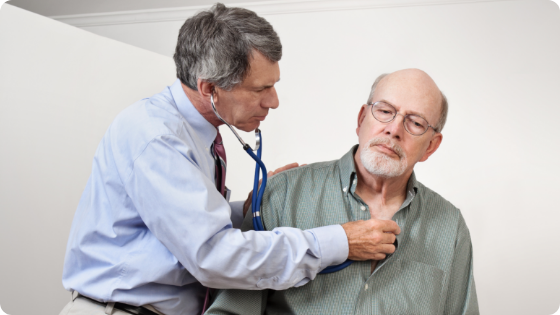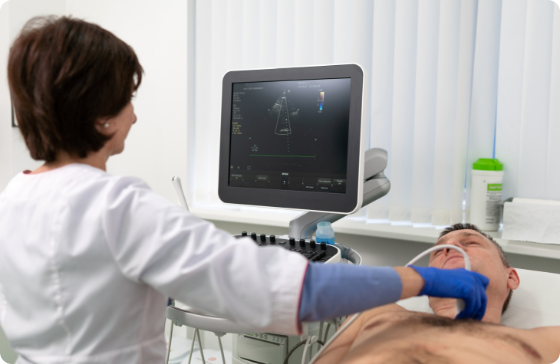Who is a Candidate for
Heart Screening?
While a heart wellness checkup is valuable for everyone, certain individuals are particularly encouraged to undergo screening due to their elevated risk factors.
Candidates for heart screening include:
- Individuals with a family history of heart disease.
- Those with high blood pressure or hypertension.
- Individuals with high cholesterol levels or a history of elevated lipid levels.
- People with diabetes or prediabetes.
- Smokers or individuals exposed to secondhand smoke.


- Those leading a sedentary lifestyle or with a lack of regular physical activity.
- Individuals who are overweight or obese.
- Those with a poor diet high in saturated fats, Trans fats, cholesterol, and sodium.
- Those with a poor diet are high in saturated fats, Trans fats, cholesterol, and sodium.
- People experiencing chronic stress or high levels of anxiety.
- Individuals over the age of 40 for men and over 50 for women, although younger individuals with risk factors may also benefit from screening.
How is Heart Health
Screening Done?
At Cardiology Care, heart screening is conducted with thoroughness and precision to ensure accurate assessment and diagnosis. The process typically involves the following steps:
Understanding The Results and What
Happens Next
Following heart disease screening, our team of expert cardiologists will carefully review your results and provide you with a comprehensive understanding of your cardiovascular health. Depending on the findings, recommendations may include:
Lifestyle Modifications
If we identify modifiable risk factors such as high cholesterol, hypertension, or obesity, lifestyle changes such as dietary modifications, regular exercise, smoking cessation, and stress management techniques may be recommended.
Medication
In some cases, medication may be prescribed to help control blood pressure, lower cholesterol levels, or manage other underlying conditions.
Further Evaluation
If we detect any abnormalities during screening, further evaluation and testing are recommended to assess the extent of cardiovascular disease and determine the most appropriate treatment.
Follow-Up Care
We conduct regular check-ups to monitor your progress, adjust your treatment plan, and ensure optimal heart health management.
Heart Conditions
We Treat
At Cardiology Care, we’re dedicated to offering thorough care for various heart issues. Our objective is to offer tailored support to each patient, aiding them in attaining the best possible heart health and overall wellness.
- Angina
- Myocardial Infarction
- Coronary Artery Disease
- Congestive Heart Failure
- Acute Rheumatic Pericarditis
- Arrhythmia
- Heart Murmurs
- Cardiogenic Shock
- Systemic and Pulmonary Hypertension
- Pulmonary Edema
- Hyperlipidemias
- Aortic Stenosis
- Claudication
- Varicose or Spider Veins
- Peripheral Artery Disease
- Acute Rheumatic Endocarditis
Frequently Asked Questions
What is a heart screening test?
A heart screening test is a medical evaluation to assess heart health and detect potential issues. It typically involves tests like electrocardiogram (ECG), echocardiogram, and stress tests to evaluate heart function and identify any abnormalities or risks. These heart disease screenings are crucial for early detection and heart disease prevention.
How to check heart health?
Routine heart health checkups, including blood pressure, cholesterol, and glucose tests, help monitor heart health.
How much does a heart check-up cost?
The cost of a heart check-up varies depending on factors like location, type of tests, and healthcare provider. Basic screenings may range from $50 to $200, while comprehensive evaluations can cost several hundred dollars or more. Health insurance coverage or a specific heart screening package may mitigate costs.
Can you prevent a heart attack?
Prevention involves healthy lifestyle choices: regular exercise, a balanced diet, and avoiding smoking. Regular medical check-ups and managing conditions like hypertension and diabetes can also lower risk.
How does cardiac screening prevent heart attack and stroke?
Cardiac screening can detect early signs of heart disease, enabling interventions to lower risk factors. Identifying issues like high blood pressure, cholesterol levels, or irregular heart rhythms allows for timely management. Ultimately, early detection and treatment through screening for heart disease can significantly reduce the likelihood of heart attacks and strokes.
How to get tested for heart disease?
To get tested for heart disease, schedule an appointment with a trusted provider like Cardiology Care NYC. Our screening process includes physical exams, lab tests, ECGs, and advanced heart scans, all tailored to detect early signs of heart disease.











